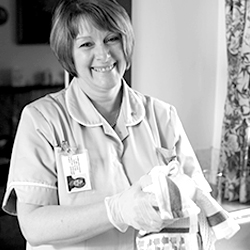Nursing associates

As a registered nursing associate working in social care, you bridge the gap between the healthcare support workers and the registered nurse and will be working with people and their families, carers, and partners to promote health and prevent ill health.
Role overview
Your nursing role will mean you will work with adults of all ages and their partners, families and carers.
- Carrying out clinical tasks such as blood pressure, temperature and ECGs.
- Monitoring an individual's condition and behaviour, and sharing this information with the registered nurse.
- Supporting adults of all ages and their partners, families, and carers.
- Working closely with a registered nurse and interacting with different professionals such as doctors, physiotherapists, occupational therapists and social workers.
- Working closely with colleagues to monitor the care and support they offer.
Skills and experience
You will have the skills and knowledge to work in teams to produce a personalised approach to the health and care needs of people. This will be identified through understanding their wishes and plan of care assessed by the registered nurse.
The most important skills are you communication and interpersonal skills. You will need to communicate, contribute and often advocate care needs with a wide range of people including professionals. You will need to understand the importance of personalised care and, alongside a registered nurse, be able to listen to people to understand how you can support them to make choices about the care they receive. You will also need good decision-making skills, be able to teach and monitor to ensure quality of care outcomes and experience.
Qualifications
The route to nursing associate is at foundation degree level either through direct entry or an apprenticeship route. Entry requirements can vary depending on where you’d like to study but most university courses will ask for GCSE grades 9 to 4 (A to C in maths and English), or Functional Skills Level 2 in maths and English.
Opportunities
Professional practice in health and care is constantly advancing and invested in innovation and better outcomes and experience for people who draw on care and support. As part of your role, you will be supported to learn and develop, ensuring you have the knowledge and skills expected of the role and the NMC your regulator.
Progression may mean deciding to complete your training to become a registered nurse and your nursing associate training will shorten a degree programme to around 18 months to two years.
You can find out more about the nursing associate role and view vacancies at the nhs website.
Case study: Norfolk Care Careers - Trainee Nurse Associate